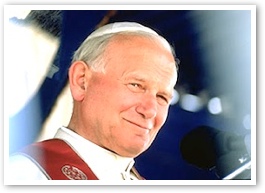Where does joy come from?
- POPE BENEDICT XVI
The crucial factor is . . . based on faith:
 |
I am wanted; I have a task in history; I am accepted, I am loved . . . Man can only accept himself if he is accepted by another. He needs the other's presence, saying to him, with more than words: it is good that you exist. Only from the You can the I come into itself. Only if it is accepted, can it accept itself. Those who are unloved cannot even love themselves. This sense of being accepted comes in the first instance from other human beings. But all human acceptance is fragile.
Ultimately we need a sense of being accepted unconditionally. Only if God accepts me, and I become convinced of this, do I know definitively: it is good that I exist. It is good to be a human being. If ever man's sense of being accepted and loved by God is lost, then there is no longer any answer to the question whether to be a human being is good at all. Doubt concerning human existence becomes more and more insurmountable.
Where doubt over God becomes prevalent, then doubt over humanity follows inevitably. We see today how widely this doubt is spreading. We see it in the joylessness, in the inner sadness, that can be read on so many human faces today. Only faith gives me the conviction: it is good that I exist. It is good to be a human being, even in hard times.
 This is Meaghen Gonzalez, Editor of CERC. I hope you appreciated this piece. We curate these articles especially for believers like you.
This is Meaghen Gonzalez, Editor of CERC. I hope you appreciated this piece. We curate these articles especially for believers like you.
Please show your appreciation by making a $3 donation. CERC is entirely reader supported.

Acknowledgement
Pope Benedict XVI. "Where does joy come from?" excerpt from a speech to the Roman Curia (December 22, 2011).
The Author

 Pope Benedict XVI is the author of Jesus of Nazareth, Vol II, Jesus of Nazareth, Vol I, Caritas in Veritate: Charity in Truth, Saved in Hope: Spe Salvi, God Is Love: Deus Caritas Est,The End of Time?: The Provocation of Talking about God, Truth and Tolerance: Christian Belief and World Religions, Without Roots: The West, Relativism, Christianity, Islam, Salt of the Earth: An Exclusive Interview on the State of the Church at the End of the Millennium, God and the World: Believing and Living in Our Time, In the Beginning: A Catholic Understanding of the Story of Creation and the Fall, The Spirit of the Liturgy, The Ratzinger Report: An Exclusive Interview on the State of the Church, Introduction to the Catechism of the Catholic Church, Introduction to Christianity, Called to Communion: Understanding the Church Today, Milestones: Memoirs 1927-1977, Behold the Pierced One, and God Is Near Us: The Eucharist, the Heart of Life.
Pope Benedict XVI is the author of Jesus of Nazareth, Vol II, Jesus of Nazareth, Vol I, Caritas in Veritate: Charity in Truth, Saved in Hope: Spe Salvi, God Is Love: Deus Caritas Est,The End of Time?: The Provocation of Talking about God, Truth and Tolerance: Christian Belief and World Religions, Without Roots: The West, Relativism, Christianity, Islam, Salt of the Earth: An Exclusive Interview on the State of the Church at the End of the Millennium, God and the World: Believing and Living in Our Time, In the Beginning: A Catholic Understanding of the Story of Creation and the Fall, The Spirit of the Liturgy, The Ratzinger Report: An Exclusive Interview on the State of the Church, Introduction to the Catechism of the Catholic Church, Introduction to Christianity, Called to Communion: Understanding the Church Today, Milestones: Memoirs 1927-1977, Behold the Pierced One, and God Is Near Us: The Eucharist, the Heart of Life.




